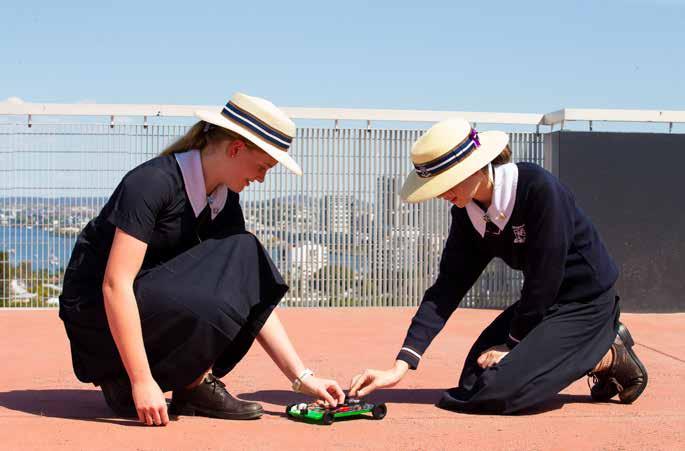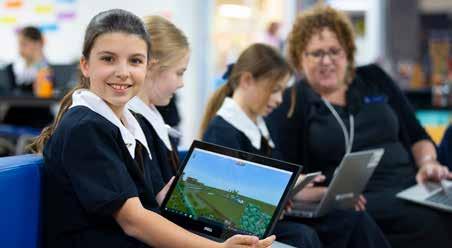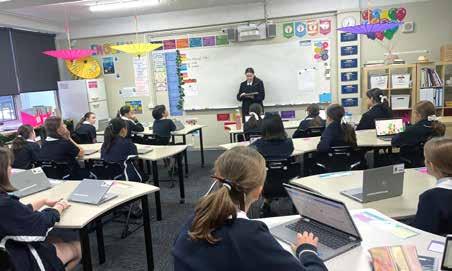
3 minute read
Teamwork makes the dream work
Effective teamwork and collaboration skills are considered essential attributes for students’ future careers.
At St Margaret’s, students are given many opportunities to work collaboratively in groups, developing their team building skills. In the classroom they work towards a common project goal, while on the sporting field, they are required to work together to achieve success as a sporting team, and on the stage, they work in harmony to perform as an ensemble.
Teamwork skills are also developed when students are engaged in extracurricular clubs, and in 2022, the breadth and depth of these activities were expanded to include several new opportunities to further hone students’ teamwork skills.
Stem Club
In STEM Club, students in Years 7 and 8 had the opportunity to explore the areas of science, technology, engineering, and mathematics through inquiry based, student-led learning while also fostering their teamwork and collaboration skills.
Secondary teacher and club coordinator Colette Anderson said the students’ exploration was hands on and project based.
‘The students worked in groups to construct solar and battery powered cars by following a set of technical instructions.
‘In Term 4, they tested their hand-eye coordination and spatial awareness flying drones through obstacle courses. ‘Through both projects, students fostered their teamwork and collaboration skills, working in self-directed groups to delegate, assign roles and problem solve,’ Colette said.
This year, the club will also welcome students in Years 9 and 10 and will have an engineering focus through a bridge design and construction project.
Minecraft Club
The Minecraft Club, for students in Years 4 and 5, aims to foster teamwork through coding. In groups, students are challenged to develop design solutions to set ‘build challenges’, such as constructing a treehouse or building the house of their dreams.
Primary teacher and Minecraft Club coordinator Laurie Wilson said although Minecraft can be played individually, it really comes into its own when players work together.
‘In “survival mode”, players have to source their own materials, and protect themselves from attack. This is best done in a team, where players can share resources and work together to achieve common goals. Building can also be time consuming, so working in a team and distributing responsibilities is often the best way to get the job done.
‘Apart from teamwork, Minecraft also fosters other soft skills such as leadership, problem solving, creativity, and critical thinking. As Minecraft is not a game involving levels of play, students have the ability to create their own “game play”, developing creative and critical thinking skills as they play,’ Laurie said. Whenever groups are working together, it is inevitable that problems and conflicts will arise, and Minecraft Club is a supportive environment for students to develop their conflict resolution skills.
‘We often start by discussing group work positives and negatives, and as a group, come up with an agreement for what we want our groups to look like, feel like, and sound like. This gives students agency over their behaviour and can be referred to when things go awry.
‘The great thing about practising these skills while playing Minecraft is that they are so engaged and easily adopt successful problem-solving strategies in order to keep playing and achieve their goals,’ Laurie said.

Debating Mentoring Program
In 2022, a new initiative was adopted for the primary debating program which saw Year 11 students mentor primary debaters. The mentors served as role models, big sisters and advisors to their mentees, helping them prepare for debates by reading and polishing speeches or giving advice on public speaking.
2022 primary debating coordinator Kimberley Bachmann said the peer coaching was a great example of collaboration with both the mentors and the mentees learning from and finding value in the relationship.
‘The Year 6 students relished in the opportunity to learn new skills from the older students, and it was a great leadership opportunity for the Year 11 students in preparation for their role as school leaders in Year 12,’ Kimberley said.
Year 11 student Olivia Crombie took the initiative to run a rebuttal Master Class after the Year 6s received feedback following their first debate.
‘I found it so rewarding to not only really consider and find ways to communicate the fundamentals of debating to the younger girls but also to observe the students absorb and implement the information, skills and strategies I’d shared. It was a really valuable chance for me to take a step back and really examine what debating is and break it down into fundamental blocks,’ Olivia said. The debating coaching sessions took place weekly with around six Year 11 mentors sharing their knowledge and experience with the 33 Year 6 students.









